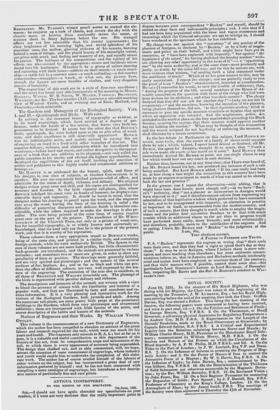ANTIGUA CONTROVERSY.
TO THE EDITOR OF TILE SPECTATOR. 7th June, 1831. should not have again obtruded my speculations on your readers, if I were not very desirous that the really important point in dispute between your correspondent " Buckra" and myself, should be settled on clear facts and indisputable principles ; and, I own that if I had not been long acquainted with the loose and vague statements and reasonings which the Colonial advocates are apt to indulge in, I should have wondered at the specimen which he has exhibited.
My charge was not against the "intentions" of any portion of the planters of Antigua, as declared by "Buckra," or by a body of magis- trates and police on their behalf, and which might have been put in execution, or "have been neglected with impunity," but against "the legislature of the island," for having abolished the Sunday market "with. out allowing any other opportunity in the room of it"—i. e. "appointing one" by the same authority, and at the same time—most prudently and justly, no doubt, by the same bill too ; and for this he accuses me, with more violence than wisdom, "of sending forth a false statement under the semblance of truth." Which of us has gone nearest to this may be easily ascertained. I repeat the charge; and am perfectly ready to rest the proof of it on " Buckra's " own statement, intended as a confutation. He says (I transcribe his words, to save the trouble of reference), that, during the progress of the bill, several members of the House of As- sembly consulted on the question with those of the clergy who had been most zealous for its abolition ' • and what was their answer ? The clergy declared that they did not ask for another day !"—(why we are left to conjecture)—" and the members, knowing the intention of the planters, being planters themselves, did not, their legislative wisdom,' think it necessary to pass any specific measure to enforce or legalize that against which no opposition was intended. And the magistrates, police, &c. attended in the market-place on the four market-days preceding the Black Sunday, assuring the negroes that their masters would appoint another day for holding the market." What may be thought of this transaction and the reason assigned for not legalizing or enforcing the measure; I shall illustrate by a recent occurrence.
In the last debate in Parliament on this subject, Lord Howrcx as- serted, most truly, that the owner of a family of slaves could separate them by sale ; which, indeed, I never heard denied or doubted, till Mr. BURGE, the agent for Jamaica, thought fit to assert, that "if such a sale were made, the courts of law would set it aside." Lord Howicx. then immediately desired Mr. Bo R GE to point out one single clause in any law which would bear out any court in such decision.
Neither then, however, nor at any time since, that I have ever heard of, has Mr. B (mon found his law, nor produced any instance of such a sale being annulled. But Lord HOWICK added, If the case really had been so, at how cheap a rate might the concession to this country have been made by an express enactment in words of what was stated to be already both the law and practice !"
In the present case I repeat the observation—only adding, that it might have been done herein more cheaply still ;—as we have " Buck- ra's " authority, that "not a planter or slave-owner in Antigua would have objected to it ;" and I therefore cannot refrain from expressing my admiration of that legislative wisdom which preferred to leave unenacted by law, and to be transgressed with impunity, an alteration in practice so important in itself, so recommended from the mother-country, and of such a nature, that they thought it worth while to employ the magis. trates and the police four successive Sundays to do that with much trouble which an additional clause to the act then in progress would have performed more easily, more formally, and more substantially; and therefore, probably, more to the satisfaction of the negroes. And so saying, I leave Mr. BURGE and "Buckra" to the judgment of the
public. I am, Sir, Your obedient servant,
A FRIEND TO FREEDOM AND TRUTH. P. S. "Buckra" represents the negroes as crying that" their souls were their own, and that they had a right to spend God's day as they chose." It may be so in Antigua, where I believe there is more tole- ration and more teaching than elsewhere ; but most authentic commu- nications inform us, that in Jamaica and Barbadoes methods intolerably cruel and unjust have been employed to convince them of the contrary, and that their masters will, if possible, control their souls also.—See particularly Lord GODERICR'S Letters to Lord BELMORE, of December last, respecting Mr. BETTY and the Rev. G. Bamoss's conduct in Wm- MAUS'S case.


























 Previous page
Previous page